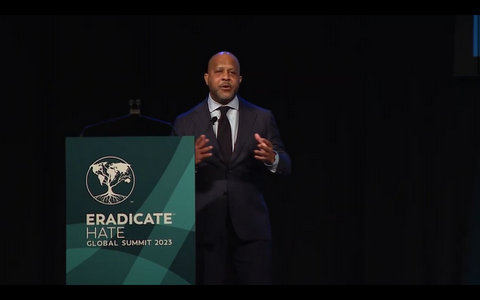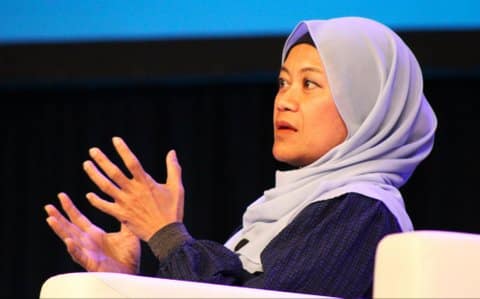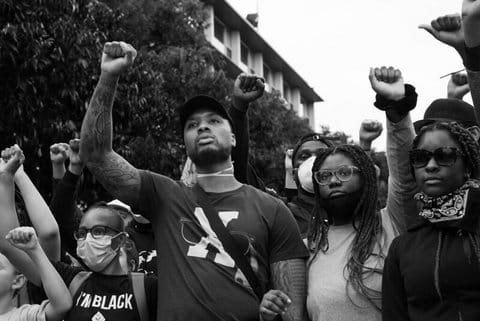
12 May ‘License to Hate’: Political Leaders, Misinformation Key Contributors to Bigotry, Veteran Journalist Says

CBS News correspondent Jeff Pegues was one of the keynote speakers at the third annual Eradicate Hate Global Summit. (Screenshot captured by Danielle Parenteau-Decker / The CC Pulse)
Editor’s note: The Eradicate Hate Global Summit began in 2021 in response to the mass shooting at the Tree of Life synagogue. Last year, The CC Pulse was there for the first time in service of our Stop the Hate coverage. This is one of many stories we will publish that is about or inspired by the summit.
By Joe Porrello
PITTSBURGH — Hate will persist as long as public officials are not held accountable, according to award-winning journalist Jeff Pegues, chief national affairs and justice correspondent for CBS News.
Pegues offered this observation and a host of others about hate and hate crimes while speaking at the Eradicate Hate Global Summit in Pittsburgh last September.
The journalist has covered many tragic events rooted in bigotry over roughly three decades. His on-the-ground reporting helped earned him three Emmys and an award for excellence from the Society of Professional Journalists. He has also written several books, including “Black and Blue,” which highlights the divide between law enforcement and Black Americans.
“As someone who spent his adult life observing people, covering really difficult stories, someone who’s lived all over the world, I’ve seen a lot, and most of it has been good,” he said. He lived on three continents by the time he was a teenager, learning quickly, as he says, that America is not just baseball and cartoons.
Pegues’ parents were activists living in the U.S. South during the Jim Crow era. The stories of what they endured resonated with their son. His grandmother’s cousin was friends with Rosa Parks. As a 16-year-old Morehouse University student, his father protested with Dr. Martin Luther King Jr.
>>>From the Archives: Attacks on Voting Rights Evoke Jim Crow Era
Things have not changed that much, says Pegues. He compared current issues with hate speech and violent racism to what his parents went through prior to the civil rights movement.
“How is it that we’ve come so far but still have so far to go? How is it that, in some ways, history is repeating itself?” he said. “I saw some people standing outside a synagogue. They were proudly holding up swastikas; they didn’t have their faces covered. How in the world is this happening in this day in age that people think it’s OK to do that?”
Sixty years goes by faster than one might think, said Pegues.
“For some, it might seem like 100 years ago, but it’s not, and it’s still fresh in the minds of millions of Americans: the stories of the evils of slavery, the heroes of the civil rights struggle, the survivors of the Holocaust.”
>>>Read: Holocaust Survivor’s Life Is an Open Book Come Alive
Bold bigotry is happening nationwide, said Pegues.
“More people need to be talking about it — and we as journalists need to be doing more about it,” he said. “To change what has become a culture of hate among some communities across the globe and here in the U.S., we’re all going to have to roll up our sleeves; we’re going to have to work hard to change this narrative.”
>>>Read: Ethnic Media Spreads the Word to Help Stop the Hate
According to Pegues, emails from the U.S. Department of Justice often go unanswered at CBS. “And a lot of those emails from the DOJ pertain to hate crimes,” he said. “While you watch TV and you see all these hate crimes, there are many more happening across the country — some of which do not get reported.”
According to FBI hate crime data, 11,288 single-bias incidents involving 13,278 victims were recorded in 2022. Over half of the incidents were race-based and over half of offenders were white.
“What we’ve seen throughout the history of this country is that you have this hate in the community and it grows, and it can lead to violence,” said Pegues.
He pointed to a cycle that begins with hate crime massacres leading to similar attacks being carried out by “copycats.” These add “perverse fuel to those already filled with a combination of rage, hate, and access to high-power firearms.”
>>>Read: As Hatred of Women Increases, So Do Mass Killings
For bigotry-based violence and extremism to decrease, Pegues says accurate reporting must be done on hate crimes as well as the people creating and enforcing laws.
“It’s going to take a continued march forward to get the truth out, to make sure that misinformation doesn’t run rampant,” he said.
Holding public officials accountable, Pegues says, is the reason he became a journalist in the first place.
“What I like to tell people… is when you see me coming, you know it’s not a good sign,” he said, referring to potential interviewees. “I observe these politicians and law enforcement, and what I see is the kind of thing I haven’t seen before in my 30-year career: people just blatantly lying about what’s going on and not being held accountable.”
Pegues says many government officials try to help themselves by attacking or trying to diminish certain institutions.
“We’ve seen politicians doing their best to spread misinformation and what has become clear to me is the strategy behind it: They want to stir people up; they want to get people to look away from the real problems,” he said. “We have to do better, all of us, but especially the politicians who take what I think is the easy road to victory by dividing people or intentionally turning back the clock.”
>>>Read: Hate on the Rise, Politics Partly to Blame
Part of the reason for rising hate, Pegues believes, is government officials misinterpreting the First Amendment.
“People have been given a license to hate because some political leaders have said, ‘Hey, it’s wrong to be politically correct… just say what’s on your mind’. While that sounds like freedom of speech, it’s actually a lack of respect for others,” he said.
The part voters play in the reduction of hate is critical.
“If you want to see a change in hate crimes going down rather than up, this presidential season that’s upcoming, think about that. Think about what leaders locally, leaders on school boards, leaders in Congress, leaders in the oval office are saying,” he said.
>>>Read: Secretary of State Outlines How to Reduce Bigotry in Voting
Voters need to be given accurate information on candidates and issues, Pegues says, something not often the case.
“What concerns me is that there’s still too many people — and some of them really intelligent people — who take this misinformation and they ingest it, and you can’t say anything to change their minds,” he said.
According to Pegues, overcoming hate crimes begins with proper leadership.
“Unless you have people at the top, at all levels talking about these issues as they are, then we’ll continue to see these numbers go in the wrong direction,” he said.
>>>Read: State and Local Strategies Battling Bigotry Are Critical, Expert Says
Focusing on what binds us together, Pegues noted, will enable change for the better.
“This country has always been a melting pot where people come together from different cultural backgrounds and change things, innovate,” he said. “No matter where you come from… the thing we all share is that desire for our families to do better, for generations of our family to progress.”
This resource is supported in whole or in part by funding provided by the State of California, administered by the California State Library in partnership with the California Department of Social Services and the California Commission on Asian and Pacific Islander American Affairs as part of the Stop the Hate program. To report a hate incident or hate crime and get support, go to CA vs Hate.





No Comments